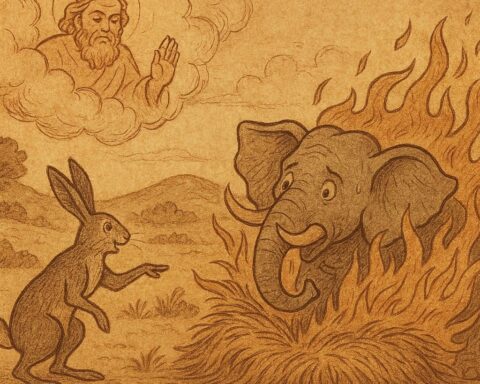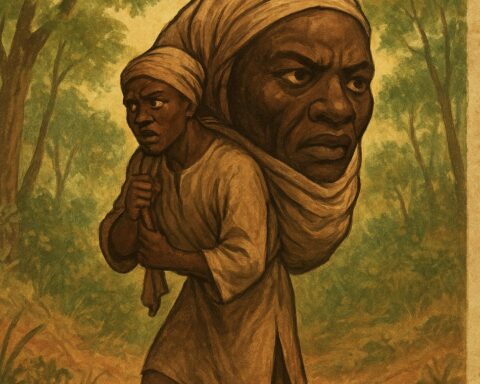There was once a man named Mamadou who longed for knowledge. Leaving his home in Oualo, he journeyed to Kayor in search of a school where he might learn to read and write. There, under the guidance of a seriny, a learned teacher, Mamadou applied himself diligently. Among his fellow pupils, he soon discovered an unusual companion: a jinn, born in the very same place as Mamadou, and of the same age. Though Mamadou could not see the jinn in his true form, the spirit knew him well, for the jinns see humans clearly, even as humans remain blind to them.
One day, the jinn approached Mamadou and said, “We are friends, yet you have gained the knowledge of letters while I have not. Since you are returning home, I will send you with a message for my family. I will also grant you a gift. Take this silver ring. When it is on your finger, you will see the jinns and their villages. If you take it off or lose it, you will see nothing.”
The jinn instructed Mamadou to spread his sheepskin on the ground and sit upon it with the other pupils. “Close your eyes,” he said, “and turn westward.” Obediently they did so. In an instant, the skin lifted, carrying them like a wind-borne cloud, and they descended gently into the heart of Oualo. They landed on their feet as lightly as if they had leapt down from a low wall.
The next morning, Mamadou tested the ring. To his astonishment, he saw the villages of the jinns, their dwellings spread across the unseen world. He sought out the mother of his jinn friend and delivered his message. “Your son wishes you happiness,” he told her. “He is still studying with the seriny at Kayor.” The parents rejoiced at this news and welcomed Mamadou warmly. They invited him to visit often in the evenings, between eight and nine o’clock, when their world was open to his.
READ THIS: The Yumboes: Spirits of the Jaloff People | An African Folktale
Mamadou accepted, and soon his visits became frequent. It was during these times that he met Anta, the sister of his jinn friend. She was beautiful, with a grace that stirred his heart. Mamadou longed to marry her, and he told her so.
Anta smiled but hesitated. “I could not wish for anything better,” she admitted. “But I fear marrying a human. You are quick to anger, boastful, and careless with the truth. Among us jinn, no one loses his temper, no one betrays a secret, no one tells a lie.”
Mamadou swore he would change. “Once we are married, I will never lose my temper, never boast, and never lie.”
Moved by his promise, Anta agreed. “Very well. I will be your wife. But there are conditions. I will stay with you only on Mondays and Thursdays. On no account must another wife be present when I come, for if I find her there, I will kill her. And above all, you must never reveal to anyone that I am a jinn.”
Mamadou accepted, and their union began. Anta came faithfully on the appointed nights. She asked for no dowry at first, saying, “Let me first be certain of your truthfulness and your temper. Later, a single heifer will be enough.”
For a time, their marriage was filled with joy. But one night, Anta lingered until four in the morning. Shortly after she left, disaster struck. At dawn, Mamadou’s granary of millet caught fire and was consumed. By six o’clock, his prized horse lay dead. At eight, word reached him that his great bull had slipped into a well and perished.
When Mamadou’s second wife saw the losses, she cried bitterly, “This is the price of marrying a jinn! In one day, all is ruined, your millet gone, your horse dead, your bull destroyed. Soon this very house will fall.”
Anta overheard these words as she returned to Mamadou’s compound. Grieved, she withdrew silently to her own village. Later, when Mamadou slept, she came and took back the silver ring. From that moment, he could no longer see her world.
Days turned into weeks. A month passed without a single visit. Then one morning, when Mamadou’s other wives had gone to the farm, Anta appeared again. She woke him gently, but when he rushed to embrace her, their words turned to reproach.
“Why have you abandoned me?” Mamadou demanded.
“I left because you betrayed me,” Anta replied. “You revealed my secret. Your wife knew I was a jinn. Did I not warn you? And when misfortune struck your house, you forgot your promise. You became boastful and angry.”
She told him what he had not known: on the night of the disasters, the Angel of Death, Azrael, had come to claim him. “I fought him off three times,” she said. “Each time, he struck something dear to you instead: your granary, your horse, your bull. Finally, he demanded your daughter. I saved her life at the cost of the bull. Better that than losing your family entire. Yet you still failed to keep faith.”
Her voice grew firm. “Do you see now why the union of jinns and humans is impossible when promises are broken? We cannot live with anger, lies, or betrayal.”
With those words, Anta departed. Mamadou never saw her again.
Moral Lesson
This tale shows that love between different worlds whether human and jinn or simply people of different natures, can only survive on trust, honesty, and self-control. Mamadou’s downfall was not the jinn’s nature but his own weakness: his anger, his pride, and his careless tongue.
The story reminds us that promises bind us not only to others but to ourselves. When we break them, we destroy the very relationships that give our lives meaning.
Knowledge Check
1. Who was Mamadou’s teacher in Kayor?
A seriny, a learned man who taught him to read and write.
2. What magical item did the jinn give Mamadou?
A silver ring that allowed him to see jinns and their villages.
3. Under what conditions did Anta agree to marry Mamadou?
She would visit only on Mondays and Thursdays, no other wife could be present, and he must never reveal she was a jinn.
4. What disasters struck Mamadou after Anta stayed late?
His granary burned, his horse died, and his bull fell into a well.
5. Why did Anta leave Mamadou?
Because he betrayed his promise by revealing her secret and failing to control his temper and tongue.
6. What hidden truth did Anta reveal about the disasters?
She had saved Mamadou, his wife, and daughter from death by deflecting the Angel of Death onto his property and animals.
Source: Wolof (Jaloff) Folktale, The Gambia, West Africa. Recorded in The Fairy Mythology by Thomas Keightley (1828).







